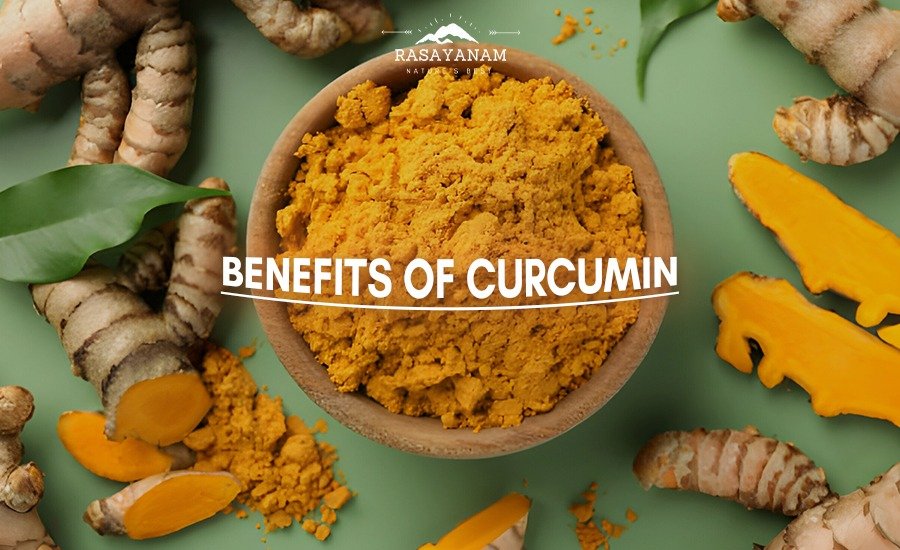Curcumin is a powerful herb found mainly in turmeric, and there are many benefits of curcumin for our health; it helps reduce inflammation, is anti-ageing, and much more.
In this blog, we will learn more about the benefits of curcumin and how you should incorporate it into your daily diet to get overall health benefits.
What is curcumin?
Curcumin is an extract of the main compound present in turmeric. It is derived from Curcuma longa, a flowering member of the ginger family of plants.
Curcumin has been used in our kitchens for a long time. It is widely used to make curry. Curcumin is a type of polyphenol that has many benefits, like anti-inflammatory properties and the ability to increase the amount of antioxidants that the body produces.
There are many benefits of curcumin: reduced inflammation and anti-ageing properties will help keep your skin blemish-free, reduce the signs of acne and give you an even tone.
Turmeric vs curcumin: What is the main difference?
Turmeric:
Turmeric, also known as Curcuma longa, is a flowering plant belonging to the ginger family, which is cultivated in Southeast Asia and India and has been used for centuries as a spice, colouring agent, and traditional medicine.
The vibrant yellow-orange hue of turmeric comes from its active compounds called curcuminoids, of which curcumin is the most prominent. Turmeric vs curcumin – the difference is very little. Curcumin is the main active ingredient that gives the turmeric a yellow colour.
Curcumin:
Curcumin is a polyphenolic compound that constitutes approximately 2-8% of turmeric’s composition. It is responsible for many of turmeric’s health benefits, including its anti-inflammatory, antioxidant, and potential anticancer properties.
While turmeric contains various other compounds besides curcumin, it is curcumin that has garnered the most attention from researchers due to its potent medicinal properties.
Benefits of curcumin
Curcumin has so many benefits; it helps reduce inflammation and free radicals. Like other plant-based foods, curcumin, derived from turmeric, is rich in phytonutrients that may protect the body by neutralising free radicals and protecting cells from damage. There are so many uses of curcumin that it becomes essential to include it in your diet.
The following are some of the benefits of curcumin that one should be aware of: –
1. Anti-inflammatory
One of curcumin’s benefits is that it helps reduce inflammation. Various studies, as reported in the Johns Hopkins Medicine Journal, show that patients with osteoarthritis have reported less joint pain with increased use of turmeric or curcumin.
2. Increases antioxidants
It is very important to add antioxidants to your diet to help reduce the chances of oxidative damage to your cells and prevent certain diseases like heart disease and certain cancers. Therefore, use of curcumin in your diet is a must; it has antioxidant properties, which help reduce the oxidative stress caused in the body.
3. Pain relief
Curcumin has been shown to have analgesic properties, making it effective in managing pain associated with conditions like osteoarthritis and rheumatoid arthritis.
Also Read: How Can Low Testosterone Levels Be Overcome Using Testosterone Boosters?
4. Improved brain health
According to some research, curcumin may lessen oxidative damage and inflammation in the brain, which may assist in preserving against neurodegenerative illnesses like Alzheimer’s disease and enhance cognitive performance.

5. Heart health
Curcumin may have benefits for heart health by improving endothelial function, lowering cholesterol levels, and reducing the risk of heart disease and stroke.
6. Cancer prevention and treatment
According to much research, it has been proven that curcumin helps prevent cancer by preventing the growth of cancer-causing cells, reducing inflammation, and encouraging cancer cells to undergo apoptosis or cell death (when the cells die, which is beyond repair in multicellular organisms). It may also enhance the effectiveness of chemotherapy and radiation therapy.
7. Improves Digestive Health
Curcumin helps in digestion by stimulating the production of bile and enzymes in the stomach. This further helps in the breaking down of food and improves nutrient absorption within the body. Therefore, the use of curcumin is very crucial for maintaining better gut health.
8. Skin health
Curcumin has anti-inflammatory and antimicrobial properties, which make it beneficial for treating various skin conditions. It helps reduce signs of ageing, acne, eczema, and psoriasis and also assists in the wound healing process.
9. In weight management
Some research suggests that curcumin may help in weight loss and weight management. It helps reduce inflammation, improve insulin sensitivity, and enhance fat metabolism, which further assists in your weight loss journey.
10. Joint health and arthritis
Curcumin’s anti-inflammatory properties make it effective in relieving joint inflammation and arthritis. Various studies, as reported in the Johns Hopkins Medicine Journal, show that patients who are dealing with osteoarthritis have reported less joint pain with increased use of turmeric or curcumin.

The above-mentioned points highlighted the benefits and uses of curcumin in our day-to-day lives and proved the necessity of adding the right amount to gain maximum benefits.
Also Read: Ayurvedic tips for a healthy lifestyle.
How many curcumin capsules or supplements do you need daily?
The appropriate dosage of curcumin can depend on many factors, such as the individual’s health status, the specific condition being treated, and the form of curcumin being used (e.g., supplements, turmeric powder). If using turmeric powder as a spice, there is no specific recommended dosage, but incorporating it into your diet regularly can still provide health benefits. But, the biggest drawback is that curcumin has poor bioavailability, meaning that much of it is not absorbed into the bloodstream when taken.
To enhance absorption, it is often recommended to take curcumin capsules in your diet with black pepper extract (piperine) or in a formulation designed to improve bioavailability.
Recommended Dosage
Dosages of curcumin supplements typically range from 500 mg to 2,000 mg per day. You should check the manufacturer’s recommendations on the product label to check the amount of curcumin needed in the body or consult with a healthcare professional for personalised guidance.
However, it is important to speak with a healthcare expert to determine the right dosage and assure safety before beginning any new supplement regimen, especially if you have any previous health concerns or are taking medications.
Commonly asked question
Q. What are the main benefits of curcumin?
A. Curcumin may be able to assist with the treatment of metabolic syndrome, oxidative and inflammatory diseases, arthritis, anxiety, and hyperlipidemia, according to research. It may also aid in controlling inflammation and stiffness in the muscles brought on by exercise, improving recuperation and performance in those who engage in physical activity.
Q. Who should avoid curcumin?
A. Using curcumin capsules in your diet may inhibit the absorption of iron. Women who are nursing or pregnant shouldn’t use curcumin pills. Those who are iron deficient.
Q. Is it good to take curcumin daily?
A. Long-term use of high dosages of turmeric and curcumin is not advised due to a lack of studies substantiating their safety. Nonetheless, the World Health Organisation (WHO) has established a tolerable daily dosage of 1.4 mg per pound (0–3 mg per kilogramme) of body weight.
Conclusion
Curcumin, a main compound in turmeric, is derived from the ginger plant Curcuma longa. But, the biggest drawback is that curcumin has poor bioavailability, meaning that much of it is not absorbed into the bloodstream when taken. To enhance absorption, it is often recommended to take curcumin supplements. It has anti-inflammatory and antioxidant properties, helps keep your skin healthy by reducing acne, blemishes and uneven skin tone, helps maintain joint health and much more.
Disclaimer: This write-up intends to provide general information and should not be considered professional advice. Kindly consult your healthcare professional for accurate dosage and modifications.
References :
https://www.healthline.com/nutrition/top-10-evidence-based-health-benefits-of-turmeric#what-it-is
https://www.hopkinsmedicine.org/health/wellness-and-prevention/turmeric-benefits





